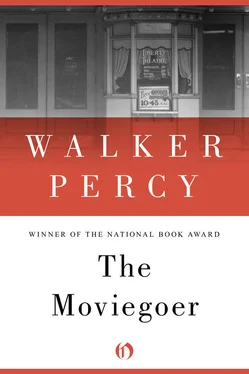“That’s right!” My mother looks over in surprise, but not much surprise, then sends her lead off like a shot. “Now Mister—!” she addresses an unknown fish and when he does not respond, falls to musing. “It’s peculiar though. You’re so much like your father and yet so different. You know, you’ve got a little of my papa in you — you’re easy-going and you like to eat and you like the girls.”
“I don’t like to fish.”
“You’re too lazy, if you ask me. Anyhow, Papa was not a fisherman, as I have told you before. He owned a fleet of trawlers at Golden Meadow. But did he love pretty girls. Till his dying day.”
“Does it last that long?”
“Anh anh anh anh anh!” In the scandal of it, Mother presses her chin into her throat, but she does not leave off watching her float. “Don’t you get risque with me! This is your mother you’re talking to and not one of your little hotsy-totsies.”
“Hotsy-totsies!”
“Yes.”
“Don’t you like Sharon?”
“Why yes. But she’s not the one for you.” For years my mother has thrown it out as a kind of proverb that I should marry Kate Cutrer, though actually she has also made an emblem out of Kate and does not know her at all. “But do you know a funny thing?”
“What?”
“It’s not you but Mathilde who is moody like your father. Sister Regina says she is another Alice Eberle.”
“Who is Alice Eberle?”
“You know, the Biloxi girl who won the audition with Horace Heidt and His Musical Knights.”
“Oh.”
Mother trills in her throat with the old music. I squint up at her through the rainbows.
“But when he got sick the next time, I couldn’t help him.”
“Why not?”
She smiles. “He said my treatment was like horse serum: you can only use it once.”
“What did happen?”
“The war came.”
“That helped?”
“He helped himself. He had been in bed for a month, up in your room — you were off at school. He wouldn’t go to the clinic, he wouldn’t eat, he wouldn’t go fishing, he wouldn’t read. He’d just lie there and watch the ceiling fan. Once in a while he would walk down to the Chinaman’s at night and eat a po-boy. That was the only way he could eat — walk down to the Chinaman’s at midnight and eat a po-boy. That morning I left him upstairs as usual. I sent Mercer up with his paper and his tray and called Clarence Saunders. Ten minutes later I look up and here he comes down the steps, all dressed up. He sits himself down at the dining room table as if nothing had happened, orders breakfast and eats enough to kill a horse — all the while reading his paper and not even knowing he was eating. I ask him what has happened. What has happened! Why, Germany has invaded Poland, and England and France have declared war! I’m here to tell you that in thirty minutes he had eaten his breakfast, packed a suitcase and gone to New Orleans.”
“What for?”
“To see the Canadian consul.”
“Yes, I remember him going to Windsor, Ontario.”
“That was two months later. He gained thirty pounds in two months.”
“What was he so excited about?”
“He knew what it meant! He told us all at supper: this is it. We’re going to be in it sooner or later. We should be in it now. And I’m not waiting. They were all so proud of him — and especially Miz Cutrer. And when he came home that spring in his blue uniform and the gold wings of a flight surgeon, I swear he was the best looking man I ever saw in my life. And so — cute! We had the best time.”
Sure he was cute. He had found a way to do both: to please them and please himself. To leave. To do what he wanted to do and save old England doing it. And perhaps even carry off the grandest coup of all: to die. To win the big prize for them and for himself (but not even he dreamed he would succeed not only in dying but in dying in Crete in the wine dark sea).
“Then before that he was lazy too.”
“He was not!”
“It is not laziness, Mother. Partly but not all. I’ll tell you a strange thing. During the war a bad thing happened to me. We were retreating from the Chongchon River. We had stopped the Chinese by setting fire to the grass with tracer bullets. What was left of a Ranger company was supposed to be right behind us. Or rather we thought we were retreating, because we got ambushed on the line of retreat and had to back off and head west. I was supposed to go back to the crossroad and tell the Ranger company about the change. I got back there and waited half an hour and got so cold I went to sleep. When I woke up it was daylight.”
“And you didn’t know whether the Rangers had come by or not?”
“That wasn’t it. For a long time I couldn’t remember anything. All I knew was that something was terribly wrong.”
“Had the Rangers gone by during the night?” asks my mother, smiling and confident that I had played a creditable role.
“Well no, but that’s not—”
“What happened to them?”
“They got cut off.”
“You mean they were all killed?”
“There wasn’t much left to them in the first place.”
“What a terrible thing. We’ll never know what you boys went through. But at least your conscience was clear.”
“It was not my conscience that bothered me. What I am trying to tell you is that nothing seemed worth doing except something I couldn’t even remember. If somebody had come up to me and said: if you will forget your preoccupation for forty minutes and get to work, I can assure you that you will find the cure of cancer and compose the greatest of all symphonies — I wouldn’t have been interested. Do you know why? Because it wasn’t good enough for me.”
“That’s selfish.”
“I know.”
“I’ll tell you one thing. If they put me up there and said, Anna, you hold your ground and start shooting, you know what I would do?”
“What?”
“I’d be long gone for the rear.”
I summon up the vision of my mother in headlong retreat before the Chinese and I have to laugh.
“We’ll never know what it was like though,” Mother adds, but she is not paying much attention, to tell the truth. I really have to laugh at her. She kneads a pink cube so the fish can smell it. “You know what, Jack?” Her eyes brim with fondness, a fondness carefully guarded against the personal, the heartfelt, a fondness deliberately rendered trite. “It’s funny you should mention that. Believe it or not, Roy and I were talking the other day and Roy, not me, said you would be wonderful in something like that.”
“Like what?”
“Cancer research.”
“Oh.”
Fishing is poor. The egret pumps himself up into the air and rows by so close I can hear the gristle creak in his wings.
5
AFTER BREAKFAST THERE is a commotion about Mass. The Smiths, except Lonnie, would never dream of speaking of religion — raising the subject provokes in them the acutest embarrassment: eyes are averted, throats are cleared, and there occurs a murmuring for a minute or two until the subject can be changed. But I have heard them argue forty five minutes about the mechanics of going to Mass and with all the ardor of relief, as if in debating the merits of the nine o’clock Mass in Biloxi as against the ten thirty in Bay St Louis they were indeed discussing religion and who can say they weren’t? But perhaps they are right: certainly if they spoke to me of God, I would jump in the bayou.
I suggest to Roy Smith, who has just returned from the Rigolets, that Sharon and I stay home and mind Jean-Paul. “Oh no,” says my mother under drooping lids. “Jean-Paul can go. Well all go. Sharon’s going too, aren’t you, Sharon?” Sharon laughs and says she will. They’ve been talking together.
Читать дальше












